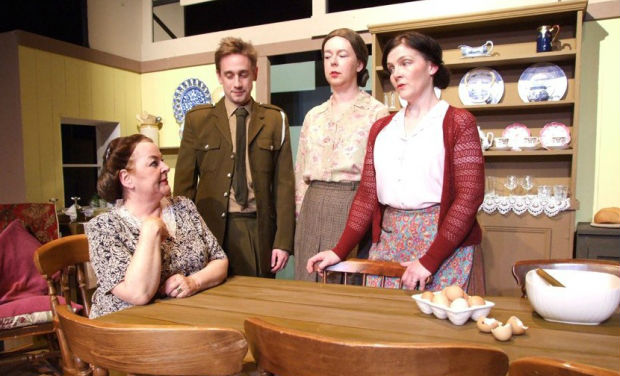@ Festival Theatre Studio, Edinburgh, until Sat 30 May 2015
If the kitchen is the apocryphal heart of the home, Dolly West’s kitchen is both cultural melting pot and seething emotional cauldron to the characters resident therein. It is certainly the heart of the play. While Dolly would seem, from the title, to be the principle character of the piece, it is gradually revealed to be very much an ensemble story, with the eponymous kitchen playing the most active role by bringing people – and conflicts – together. It is known as Dolly’s kitchen simply because she is the cook, and therefore the human focus of the domestic maelstrom around her.
The play is set, for the most part, early in the Second World War – during which Ireland was a ‘neutral’ observer – and the kitchen in question is situated in a pleasant house near the border with Northern Ireland. The opening conversation between Dolly and her maid, Anna, about eggs, belies the emotional turbulence soon to come in the form of a bigoted brother, family friction, and the arrival of English and American soldiers destined to see active duty in the war. What follows is less a clear-cut ‘plot’ and more a powerful exploration of what happens to ordinary people in extraordinary situations. As such, this play is full of surprises. The cosy domesticity of Derek Blackwood’s masterfully designed provincial Irish homestead is not untouched by the staggering atrocities playing out in the wider world, and Frank McGuinness’s script does not allow the audience to hide safely behind stereotypes and preconceptions. These characters are not so easily pegged, but are continuously and believably altered by people and circumstances as the play progresses.
These transitions and subtleties are not the easiest to convey, but Leitheatre’s nine-strong cast does so effortlessly, pulling the audience firmly into their achingly human world. Colin Peter’s direction at times allows actors to speak upstage with their backs to the audience, but copes well overall with the exigencies of a large cast on a small and busy set. All of the performances bring something crucial to the whole, but special mention is due to Jane Black as Dolly, to Iain MacDonald as the homosexual Yankee (beware those stereotypes!), Marco, and to Irene Cuthbert as Dolly’s plain-talking mother, Rima, who is the real architect of the relationship dramas that play out in her home.
The final few minutes reveal the aftermath of war, but this brief epilogue, whilst moving, seems unnecessary. The tension that builds up in the pressure-cooker atmosphere of uncertainty, ahead of any of the characters seeing real war-time action, is undermined somewhat by the actual depiction of the impact it has had upon them and their loved ones. Nevertheless, this is an engrossing performance with impeccable production values, which simultaneously moves the audience and allows them to smile wryly at what it is to be human.
